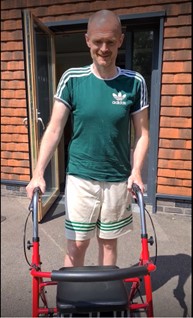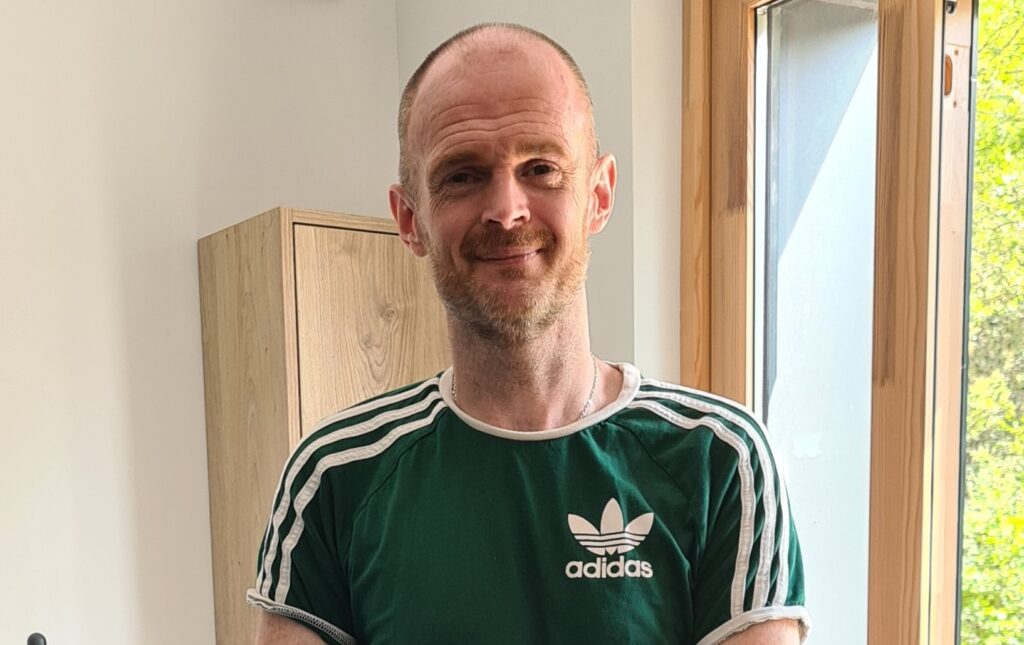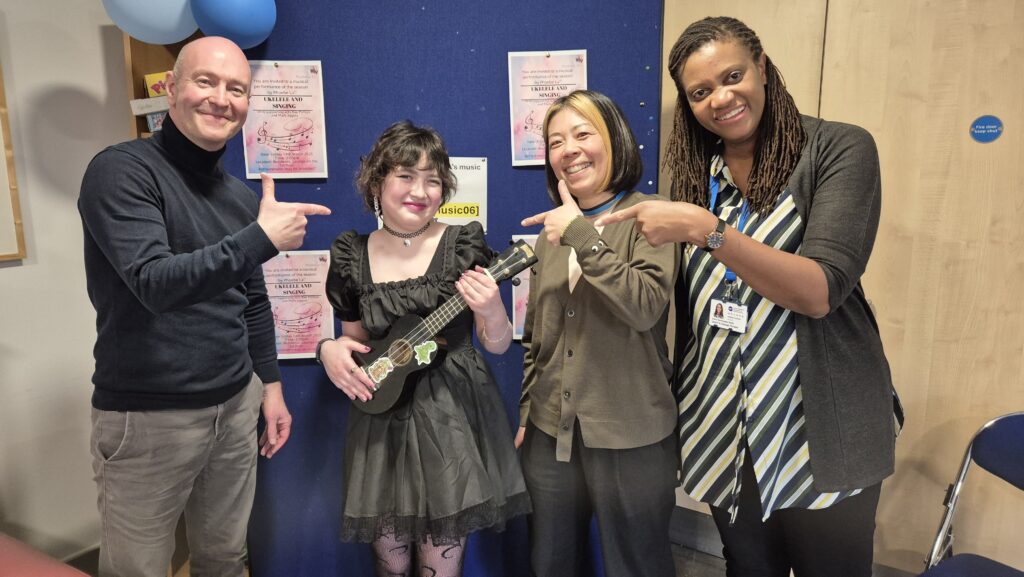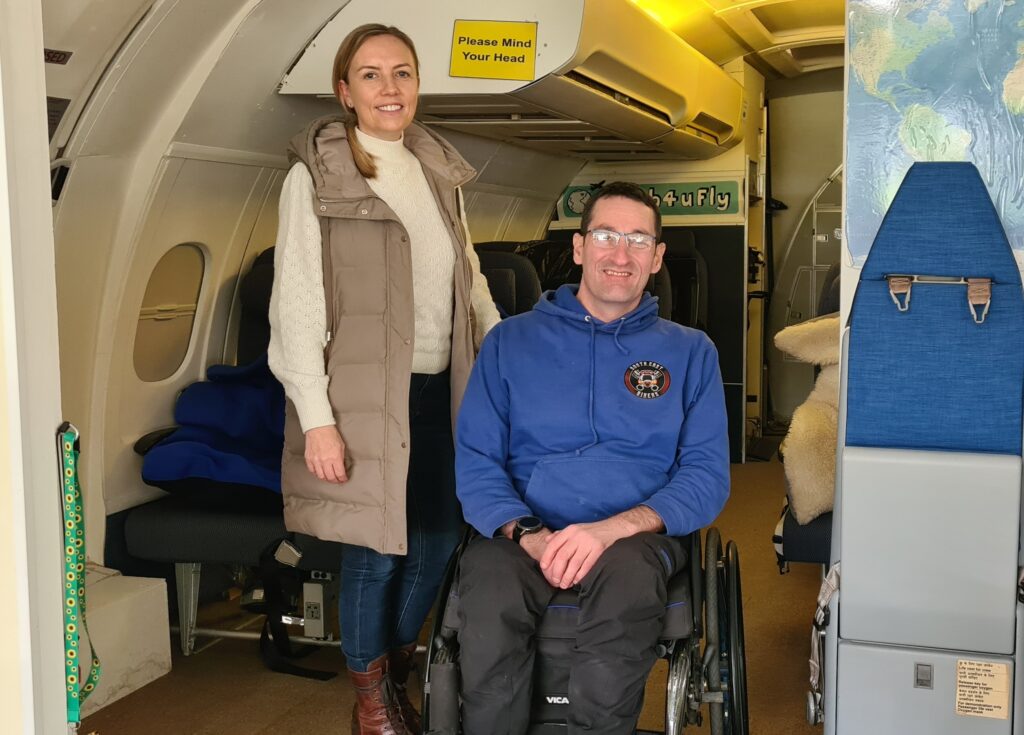Neil has been a teacher of performing arts at a school in Croydon for about 16 years. He describes his experience of developing Guillain-Barre Syndrome and how it almost totally paralysed him, and his experience of therapy and care at QEF to help him rebuild his life. He is now living independently at home again.

“Just after Christmas 2022 I started to feel unwell. I thought it was just the annual cold or flu as everyone in the department seemed to have it, but I just couldn’t shake it off. Then in early February I started to feel pins and needles in my feet and in my hands, and then it started to progress into my legs and I was having difficulty walking, especially in the morning. I was still mobile, but it was becoming a struggle.
Then in early March I woke up one morning and I couldn’t move my face – it was numb and tingly. My mouth was tense and I had blurred vision. I realised I had to go to the doctors. I got up to make myself a cup of coffee and my legs gave way and I collapsed. Thankfully they came back and I was able to get up. I called 111 who told me to get myself to A&E by taxi.
But the taxi driver dropped me at the wrong entrance and as I was walking to A&E my legs gave way again and I was on the floor and this time I was unable to get up. Eventually someone found me and they bought a wheelchair to take me to A&E.
Over the next week I deteriorated. On the Sunday I could pick things up and eat, by Monday morning I couldn’t. It got worse and eventually it almost completely paralysed me. In 4 days I basically went from a well-functioning adult to a baby. They quickly diagnosed me as having Guillain-Barre Syndrome (GBS) which attacks all the nerve endings. Thankfully it didn’t go into my diaphragm as if that happens you have to be intubated in ICU. But they got it just in time.
I was bed ridden for 5-6 weeks while I had a drug that aims to restart your immune system. Apparently you can get GBS from food poisoning, a virus, vaccines etc as the immune system starts attacking your body. It can happen to anyone, so this is utter bad luck.
I had to be fed, washed, bathed, toileted. I was almost completely paralysed and I had blurred vision for about 3 weeks so I had to wear an eye patch. I couldn’t pick anything up as I had no strength. The bit I hated most was that my eye lids wouldn’t close. So I had to have eye drops every hour and when I went to sleep I looked like the exorcist! I had 5-6 weeks in hospital in acute care to monitor whether it was going into my diaphragm, but thankfully my breathing was OK.
When I got transferred to QEF it was a blessing – you can’t recover in hospital it’s so busy and I had to learn how to use my limbs again. It was great to be able to recover in your own space and sleep in our own room with the lovely grounds around you. I couldn’t have gone home as I needed 24 hr care – I needed to be hoisted into the bathroom and had to be washed. Everything had to be done for me. Swallowing was ok but all my food had to be mushy as I couldn’t chew anything. Its very nerve racking.
At QEF there is always a sense of goal and achievement, but also reality and honesty. They say ‘we are here to support you, but you do the work and if you need help ask for it.’ You don’t realise how important the small goals are as they build to the next step. It doesn’t affect your brain so the goals sound little, but physically they are big as your limbs don’t respond like they used to. The 1:1 physio you get at QEF is absolutely essential to recovery from this.
Neil takes his first steps.
When you have lost use of your limbs the idea of getting back into the community is absolutely petrifying – what do I do if I fall? The work I did with the Occupational Team was so important for this. I went around Sainsburys using my walker and just having someone there to support you is so reassuring. I didn’t think I would be walking around Sainsburys’ with a walker until I was 80 but you just have to do it.
The sensory part of therapy is also really important, as it stimulates signals from your hands back to your brain. At the beginning my hands were hyper-sensitive so the smallest touch was agonising. But it activates the nerves and helps the physios find where you don’t have any feeling. When I got here the physio was using a gentle scrubbing brush on my finger and I couldn’t feel it!
It’s a really emotional journey and there are days when you are miserable and sad. With a click of a finger it’s a complete life change. There is a lot of fear with that about what your life is going to look like. But you get support with that here. It’s not about getting better, its about getting you to a position where you are an independent person – it might look a bit different – you might be on a walker or use a wheelchair but you are as independent as possible. That’s really important to me. It was such a big moment for me when I was able to take myself to the toilet – I actually cried when that happened. You are surrounded by people who have similar conditions and are either ahead of you or behind you. Someone here was 3 weeks ahead of me and I saw her have her hands back and seeing her progress is really lovely.
There is privacy here so you have your own time, but there is a social side too – we went to the cinema the other day and there are activities that you’re encouraged to join. Some aid your recovery and some are just fun like the Eurovision song contest party.
This room is probably the size of my flat. All the little touches like the TV and Alexa being able to close and open blinds for you, it’s one less thing to call the nurses for. It’s good to do whatever you can for yourself. Everything is all about developing your independence. When you are away from here you realise the importance of all the small things, like trying to put your socks on. That’s not easy. You don’t realise how important it is till its gone.
I’ve made a lot of progression in a short time as my body reacted well to the physio. In 10 weeks I’ve gone from bed ridden and hoisted to nearly complete independence. I make my own tea and coffee now and take myself to the bathroom. But 2.5 weeks ago I couldn’t do that – I couldn’t walk that far.
Its exciting and its nerve racking but I am looking forward to going home. Its bitter sweet to leave such a caring environment and friends. Do I like washing my clothes – no, but that’s not reality. You need a bubble when you recover, as your body has gone through a huge trauma. Last thing you need to worry about is small things like clean pants, you have bigger things to fix. Being able to go outside is a massive thing. I walk with a stick indoors and outdoors with the walker now
I can’t go back to work just yet – not full time anyway my body won’t do 5 days a week yet. I have to accept realistic goals to avoid disappointment. Looking forward I will probably go part time at a new school as a learning assistant in a primary school, as I build up my strength and will go back to full time when I can. Something like this gives you time to reflect and prioritise what’s important.”


